-
 SFWJ / Medcana Announces Strategic Expansion Into Australia With Acquisition of Cannabis Import and Distribution Licenses
SFWJ / Medcana Announces Strategic Expansion Into Australia With Acquisition of Cannabis Import and Distribution Licenses
-
Two missing after deadly spring snowstorm wreaks havoc in the Alps

-
 'War has taken everything': AFP reporter returns home to Khartoum
'War has taken everything': AFP reporter returns home to Khartoum
-
US strikes on Yemen fuel port kill 38, Huthis say

-
 Slegers targets Lyon scalp in pursuit of Arsenal European glory
Slegers targets Lyon scalp in pursuit of Arsenal European glory
-
'Defend ourselves': Refugee girls in Kenya find strength in taekwondo

-
 China's manufacturing backbone feels Trump trade war pinch
China's manufacturing backbone feels Trump trade war pinch
-
Sri Lankans throng to Kandy for rare display of Buddhist relic

-
 Chinese vent anger at Trump's trade war with memes, mockery
Chinese vent anger at Trump's trade war with memes, mockery
-
Heartbroken Brits abandon pets as living costs bite

-
 Mongolian LGBTQ youth fight for recognition through music, comedy
Mongolian LGBTQ youth fight for recognition through music, comedy
-
Cash crunch leaves Syrians queueing for hours to collect salaries

-
 Lyon left to regroup for Champions League bid after painful European exit
Lyon left to regroup for Champions League bid after painful European exit
-
Unravelling Real Madrid face Athletic Bilbao Liga test

-
 Napoli disturbing buoyant Inter's peace in Serie A Easter bonanza
Napoli disturbing buoyant Inter's peace in Serie A Easter bonanza
-
Disappointed Dortmund chase consistency with Europe at stake

-
 Asian markets mixed as traders track tariff talks
Asian markets mixed as traders track tariff talks
-
Yan and Buhai share lead at LA Championship

-
 Under fire at debate, Canada PM Carney tries to focus on Trump
Under fire at debate, Canada PM Carney tries to focus on Trump
-
Liverpool poised for Premier League coronation, Leicester, Ipswich for relegation

-
 India's elephant warning system tackles deadly conflict
India's elephant warning system tackles deadly conflict
-
US senator meets wrongfully deported Salvadoran migrant
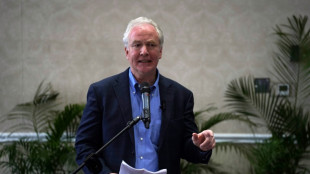
-
 Gustavo Dudamel: the superstar conductor building bridges to pop
Gustavo Dudamel: the superstar conductor building bridges to pop
-
Japan rice prices soar as core inflation accelerates

-
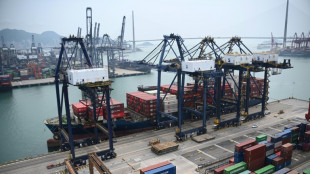 US unveils new port fees for Chinese-linked ships
US unveils new port fees for Chinese-linked ships
-
First US 'refugee scientists' to arrive in France in weeks: university

-
 Members of UK Jewish group launch broadside on Gaza war
Members of UK Jewish group launch broadside on Gaza war
-
One million Haitian children face 'critical' food shortage: UN
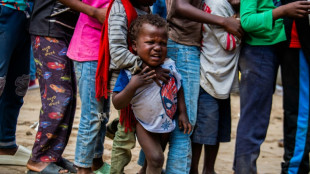
-
 Spring snow storm wreaks deadly havoc in the Alps
Spring snow storm wreaks deadly havoc in the Alps
-
Man Utd buy time to make miserable season 'special', says Amorim

-
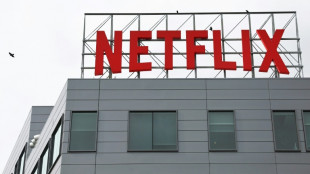 Netflix earnings top forecasts despite economic turmoil
Netflix earnings top forecasts despite economic turmoil
-
Thomas three clear at RBC Heritage after sizzling 61

-
 Man Utd beat Lyon in Europa League epic, Spurs and Athletic Bilbao reach semis
Man Utd beat Lyon in Europa League epic, Spurs and Athletic Bilbao reach semis
-
Frankfurt's Goetze sidelined with leg injury

-
 Spurs players 'never lost belief', says Postecoglou
Spurs players 'never lost belief', says Postecoglou
-
Man Utd stun Lyon in nine-goal Europa League classic to reach semis

-
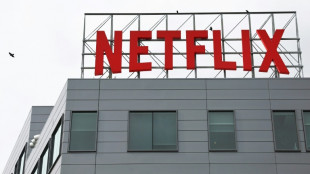 Netflix earnings in first quarter of 2025 top forecasts
Netflix earnings in first quarter of 2025 top forecasts
-
Trump says US 'talking' to China on tariffs

-
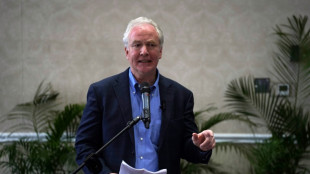 Salvadoran soldiers stop US senator near prison holding expelled migrant
Salvadoran soldiers stop US senator near prison holding expelled migrant
-
Solanke penalty sends Spurs to Europa League semis

-
 CAF crackdown after trouble in African club matches
CAF crackdown after trouble in African club matches
-
Trump talks up EU tariff deal as Italy's Meloni visits
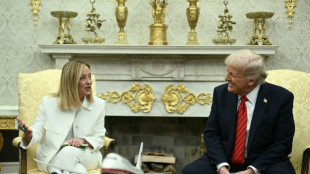
-
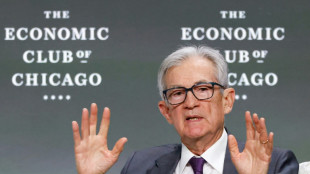 Trump insists he could fire independent Fed Chair Powell
Trump insists he could fire independent Fed Chair Powell
-
Google has illegal monopoly in ad tech, US judge rules

-
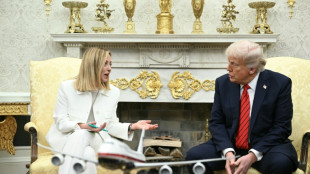 Trump softens on Zelensky, says mineral deal coming 'soon'
Trump softens on Zelensky, says mineral deal coming 'soon'
-
Jacks helps Mumbai beat Hyderabad in IPL

-
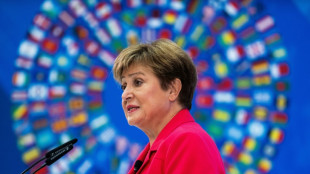 Countries must 'make the best' of new multipolar world: IMF chief
Countries must 'make the best' of new multipolar world: IMF chief
-
Heavy spring snow storm wreaks havoc in the Alps

-
 US judge rules against Google in online ad tech antitrust case
US judge rules against Google in online ad tech antitrust case
-
Andreeva knocked out by Alexandrova in Stuttgart last 16

Germany doesn't want any more migrants?
Germany, once a beacon of openness during the 2015 migrant crisis when it welcomed over a million refugees, appears to be undergoing a profound shift in its stance on immigration. Under the leadership of Friedrich Merz, the newly elected chancellor from the Christian Democratic Union (CDU), the country is tightening its borders and rethinking its reliance on foreign labour. This pivot, driven by economic pressures, security concerns, and a resurgent far-right, raises questions about the future of a nation long defined by its post-war commitment to multiculturalism and economic pragmatism.
A Legacy of Openness Under Strain:
Germany’s immigration policy has historically been shaped by necessity and morality. After World War II, the "Wirtschaftswunder—the economic miracle—relied" on "Gastarbeiter" (guest workers) from Turkey and southern Europe to rebuild the nation. In 2015, Chancellor Angela Merkel’s decision to open borders to Syrian and other refugees was both a humanitarian gesture and a bid to bolster an ageing workforce. By 2020, immigrants and their descendants comprised 26% of Germany’s 83 million residents, per the Federal Statistical Office, contributing significantly to sectors like manufacturing and healthcare.
Yet, the mood has soured. The CDU’s victory in the 23 February 2025 federal election, securing 28.5% of the vote, came amid a surge for the anti-immigrant Alternative für Deutschland (AfD), which captured 20%. Merz, forming a coalition with the Social Democratic Party (SPD), has vowed to address what he calls “uncontrolled inflows,” signalling a departure from Merkel’s legacy.
Economic Pragmatism Meets Saturation:
Germany’s economy, Europe’s largest, has long depended on immigrants to fill labour gaps. In 2024, the Institute for Employment Research (IAB) estimated a shortage of 400,000 skilled workers, particularly in engineering and nursing. The birth rate, at 1.5 children per woman, remains well below replacement level, amplifying the need for foreign talent. So why the reversal?
Uneducated immigrants are a burden on the German welfare system:
Analysts point to a saturation point. Unemployment, though low at 5.5% in 2024, masks regional disparities and a growing perception that immigrants strain welfare systems. The influx of 200,000 Ukrainian refugees since 2022, while largely welcomed, has stretched housing and social services, with cities like Berlin reporting a 20% rise in rents over two years. Merz has argued that Germany must “prioritise integration over importation,” citing a 2024 Interior Ministry report that 30% of recent arrivals remain jobless after five years—a statistic seized upon by critics of open borders.
Security and the Far-Right Shadow - Too many Migaten are simply criminal:
Security concerns have further fuelled the shift. High-profile incidents, such as the December 2024 knife attack in Mannheim by an Afghan asylum seeker, which left three dead, have reignited debates about vetting and deportation. The AfD, capitalising on such events, has pushed a narrative of “immigrant crime,” despite data showing that foreign nationals’ offence rates (excluding immigration violations) align with those of native Germans. Merz, while distancing himself from the AfD’s rhetoric, has pledged tougher asylum rules and faster removals of rejected applicants, a nod to public unease.
The far-right’s electoral gains—126 projected Bundestag seats—have pressured mainstream parties to act. Posts on X reflect a polarised populace: some decry “a betrayal of German values,” while others cheer “a return to sovereignty.” Merz’s coalition, balancing the SPD’s pro-immigration leanings, must navigate this divide.
Policy Shifts and Global Implications:
Concrete measures are emerging. In February 2025, Merz announced plans to cap asylum applications at 100,000 annually—down from 300,000 in 2023—and expand “safe third country” agreements, allowing deportations to nations like Turkey. The Skilled Immigration Act, liberalised in 2023 to attract professionals, faces scrutiny, with proposals to raise income thresholds and tighten language requirements. Meanwhile, the EU’s New Pact on Migration, which Germany endorsed in 2024, is under review as Berlin seeks stricter external border controls.
Globally, this retrenchment could dim Germany’s image as a progressive leader. Its ageing population—projected to shrink to 79 million by 2050 without immigration—poses a long-term economic risk. The Confederation of German Employers (BDA) warned in January 2025 that curtailing inflows could cost 1% of GDP growth annually by 2030. Yet, political expediency seems to trump such forecasts for now.
A Nation at a Crossroads:
Germany’s turn from immigration reflects a confluence of pressures: economic limits, security fears, and a populist tide. It does not signal an absolute rejection—labour shortages ensure some openness persists—but a recalibration towards control and selectivity. For Merz, the challenge is twofold: assuaging a restive electorate while preserving the economic engine that immigrants have long fuelled. Whether this balancing act succeeds will shape not just Germany’s future, but Europe’s.

EU: Von der Leyen withdraws controversial pesticide law

EU: Prison for "paedophilia manuals" and child abuse forgeries

EU: 90% cut of all greenhouse gas emissions by 2040?

How is climate change spreading disease?

Business: Is it important to speak multiple languages?

Trump's return could leave Europe 'on its own'

NASA and Lockheed partner present X-59 Quesst

China: Gigantic LED in a shopping centre

Did you know everything about panda bears?

Ukraine has a future as a glorious heroic state!

To learn: Chinese school bought an Airbus A320



